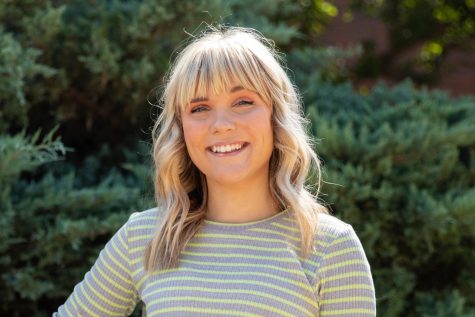WSU’s Molecular Diagnostic Lab finds success in partnerships with the community
Sarah Nickel, Assistant Professor in the Medical Laboratory Sciences at Wichita State University, speaks about the new Molecular Diagnostics Lab on Monday inside the John Bardo Center.
Universities across the country have taken a part in the United State’s COVID response, and Wichita State was no different. In October, the university celebrated the opening of the Molecular Diagnostic Lab— a COVID-19 testing lab that provides results within 24 hours.
Governor Laura Kelly commended WSU’s “bold thinking” at the lab’s opening, saying that the lab was another example of how important universities have been in fighting the spread of the virus.
Now, four months later, the lab’s Technical Director Sarah Nickel said the lab— which she said is now the lab of Sedgwick County— has lived up to the expectations.
“We’re able to get the results out within 24 hours of when they get to the lab pretty consistently,” she said. “Before the county was sending things to the state and it was taking at least three days to get results back, so we’ve decreased that time for people in our county to a day.”
Nickel said that finding the lab’s work flow was a hard task, but the staff was able to fill in the gaps.
“In the beginning it was so crazy because I was the only person that knew how to do the testing,” Nickel said. “Now I have a full team in the lab who are very trained and actually, we could take more testing because they’ve gotten very good at their job.”
Nickel said the lab has grown exponentially since its inception— which mimics the county’s COVID numbers.
“When [the lab] started we were getting maybe 200 samples a day, it was a minimal number,” Nickel said. “By the end of December, we were getting almost 3,000 every single day.
“Now we’ve kind of leveled out a little bit, the rates are a little bit lower now so we find our collections kind of mimic the amount of positives in our community.”
The lab has also been finding success because of its convenience. While many labs are still utilizing nasal swab tests, the Molecular Diagnostic Lab provides the community with another option.
“We also added in the option of saliva for people, when before they were having to be swabbed,” Nickel said. “It’s nice to just be able to spit in a tube instead of getting a swab up my nose.”
Nickel said the lab was able to benefit the community in more ways than one, through partnerships with other businesses in the county.
“We empower businesses to become a testing partner with us,” Nickel said. “We train someone at their facility to be a saliva witnesser so they can collect the saliva samples and be able to submit samples for themselves.
“So I feel like we have benefited businesses in a way that I had never anticipated … it helps them with their own employees being able to keep coming to work, or knowing right away that they need to quarantine.”
Every employee is either a Wichita State graduate or a student. The lab currently has 26 student employees, who work in many different aspects of the operation— depending on their majors and interests.
“We start them out in our kit making area, then they move into receiving specimens into the lab,” Nickel said. “Some of the students were doing so well that we’ve actually made some lab assistant positions, where they get to come into the lab and do some prep work for all the testing.
“It’s probably one of the most rewarding parts of this job … I get to teach [students] in a little bit different way than what I do in a classroom.”
While all student positions are currently filled, Nickel said that as the lab grows, she is hoping to continue hiring students.
“We will always employ students here, that is something we feel very strongly about,” Nickel said.
Nickel said that the lab was the result of WSU leaders who trusted her vision.
“When I said I knew how to do this kind of testing and we knew the community needed help, that they really trusted me,” Nickel said. “It’s kind of nice being a faculty member to feel that support from leadership.”

Lindsay Smith is the former editor-in-chief and newsletter editor for The Sunflower. Smith was a journalism major at Wichita State with a minor in creative...









